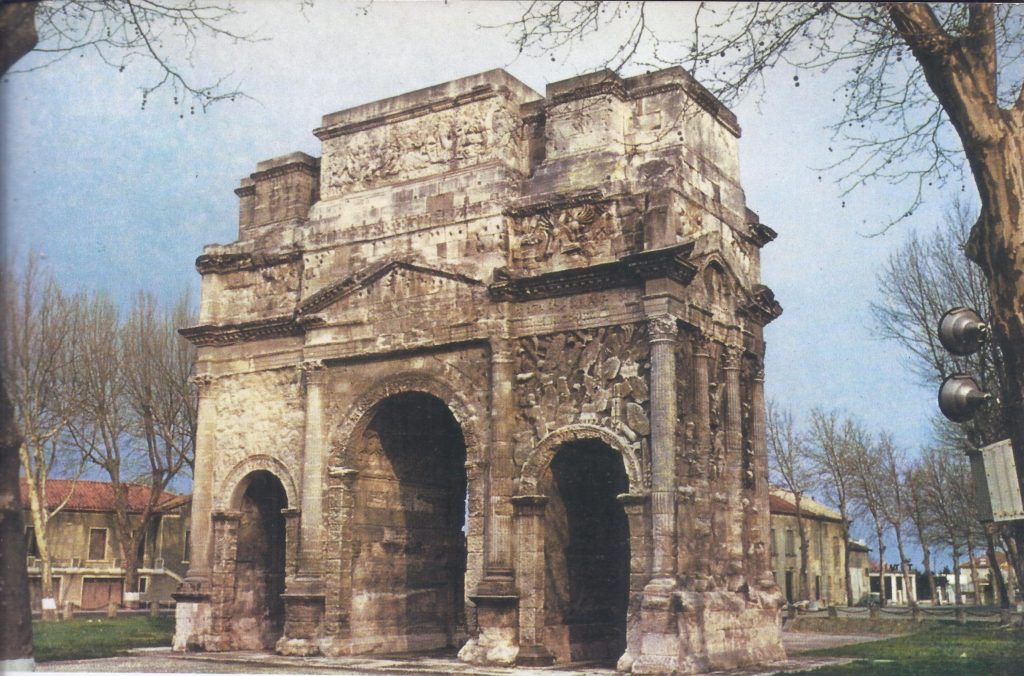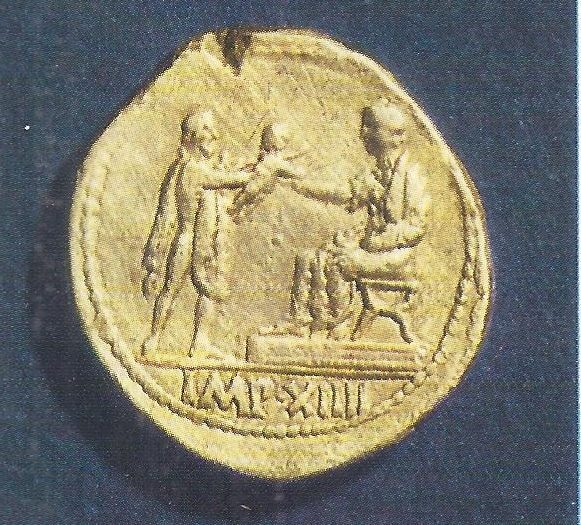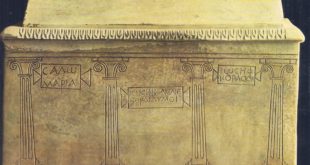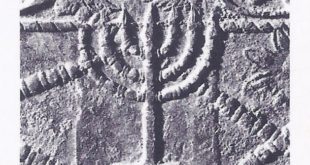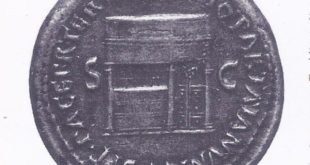By 9 B.C. it seemed that Augustus’ ambition to extend Roman territory to the Elbe had almost been achieved, but the Romans overestimated the extent to which they had successfully assimilated their new province. Encouraged by revolts in the Empire, German aspirations to freedom and prowess in arms both found their champion in Arminius, a German by birth, but also a Roman citizen. Arminius’ knowledge of the terrain made a German victory a strong possibility and his annihilation of the legions sent to maintain order shook the Empire to its core. Rome was forced to abandon any idea of a province beyond the Rhine and the implications for the future of Europe were incalculable.
Augustus pushed the frontiers of Roman dominion outward in almost every direction, but during the forty-five years of his sole rule he was forced to fight constant and simultaneous campaigns to maintain the lines he wished to draw on the map of Europe. The frontier between the subject province of Gaul and barbarian Germany was to prove especially troublesome and the whole might of Rome eventually was to be challenged by one barbarian leader, Arminius, of the Cherusci tribe. Arminius, whom Tacitus called the liberator of Germany, was not the first German to threaten Rome. Around the end of the second century B.C., two barbarian tribes, the Cimbri and the Teutons, had gradually migrated southward from the neighbourhood of Jutland until they reached the northern frontier of Rome. After pushing the Roman armies as far south as Orange, in the Gallo-Roman province of Narbonensis, they proceeded toward Italy itself. They were stopped, however, by one of Rome’s outstanding generals, Marius, who defeated them at Aix-en-Provence in 102 B.C. and obliterated them at Vercelli the following year.
Germanic pugnacity engraved itself upon the Roman mind and tongue: a man of ferocious character was called “Cimber,” and the “furor Teutonicus”’ was spoken of long after the tribe had disappeared. Although, there was nothing yet approaching a German nation, Rome remained highly conscious of this mass of Germanic peoples in northern Europe. The line of demarcation between the Celts in Gaul and the Germanic tribes to the east was vague and though the Celts tended to concentrate west of the Rhine, there was still a lot of German blood and influence in that region. Then in 58 B.C. Julius Caesar entered the picture. The territory of which he was governor included not only the Adriatic coast and what is now north Italy, but also the province of Narbonensis. Caesar picked a quarrel with Ariovistus, a German leader influential in Gaul. He then proceeded to annex all Gaul, establishing the Rhine as the frontier between Roman and non-Roman lands. Thus it came about that Caesar crystallized the idea of a subject Gaul west of the Rhine and a free Germany east.
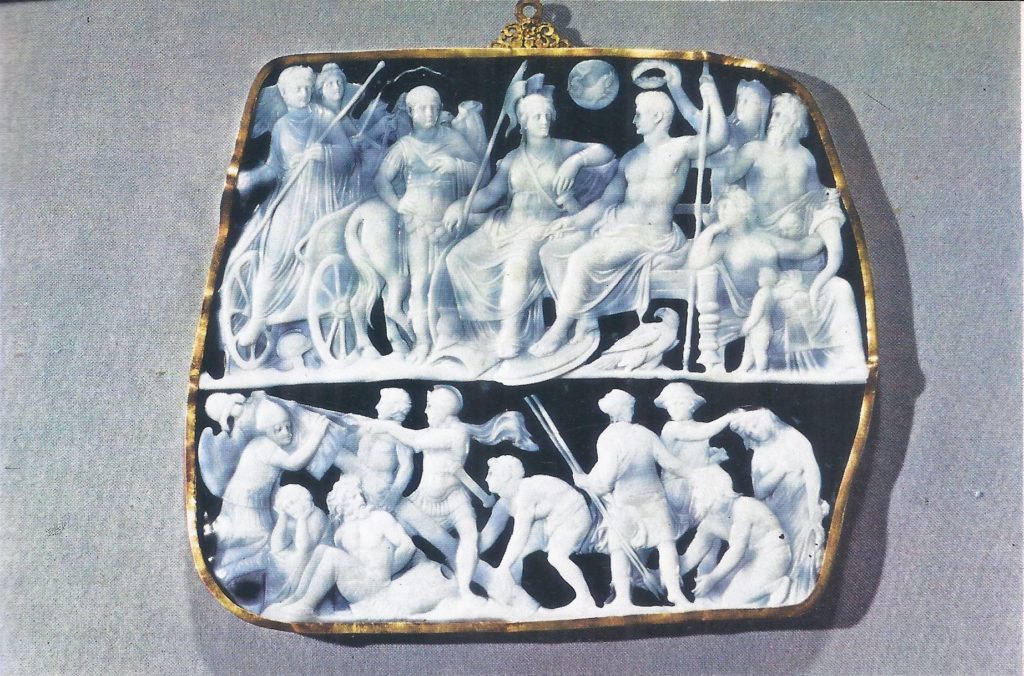
Half a century later, Augustus gradually pushed Rome’s eastern European frontier to the Danube, but a frontier consisting of the Rhine and the Danube made a very long and devious line, including a right angle along their upper courses. An Elbe-Danube line would be a great deal shorter, communications would be easier and potentially hostile tribesmen would be safely enclosed within the Empire. So Augustus’ younger stepson, Drusus, crossed the Rhine to fight four successive campaigns in Germany. He reached the Weser and finally, in 9 B.C., the Elbe. The Romans built fortresses and the entire area from the Rhine to the Elbe was regarded as a new Roman province.
The Germans were, for the most part, semi-civilized pastoral nomads. Tacitus, in his Germania, vividly describes these people with their wild, blue eyes, reddish hair and hulking bodies — politically unstable tribesmen who loved a fight but disdained work. The Romans hated their new province, “bristling with woods or festering with swamps,” but Roman influence gradually seeped in and modern excavations show that a good deal of trade was conducted.
One Roman governor after another fought laborious campaigns to consolidate the new conquests and frontiers. The greatest weakness lay in the fact that the shorter Elbe-Danube frontier could not be completed until Bohemia (now western Czechoslovakia) was conquered too. This became obvious when an astute German chief, Maroboduus, led his entire Marcomannic tribe on a migration from occupied southwestern Germany into free Bohemia and established authority over the German tribes of Saxony and Silesia. The Roman government decided that it was imperative to put a stop to the expansion of Maroboduus.
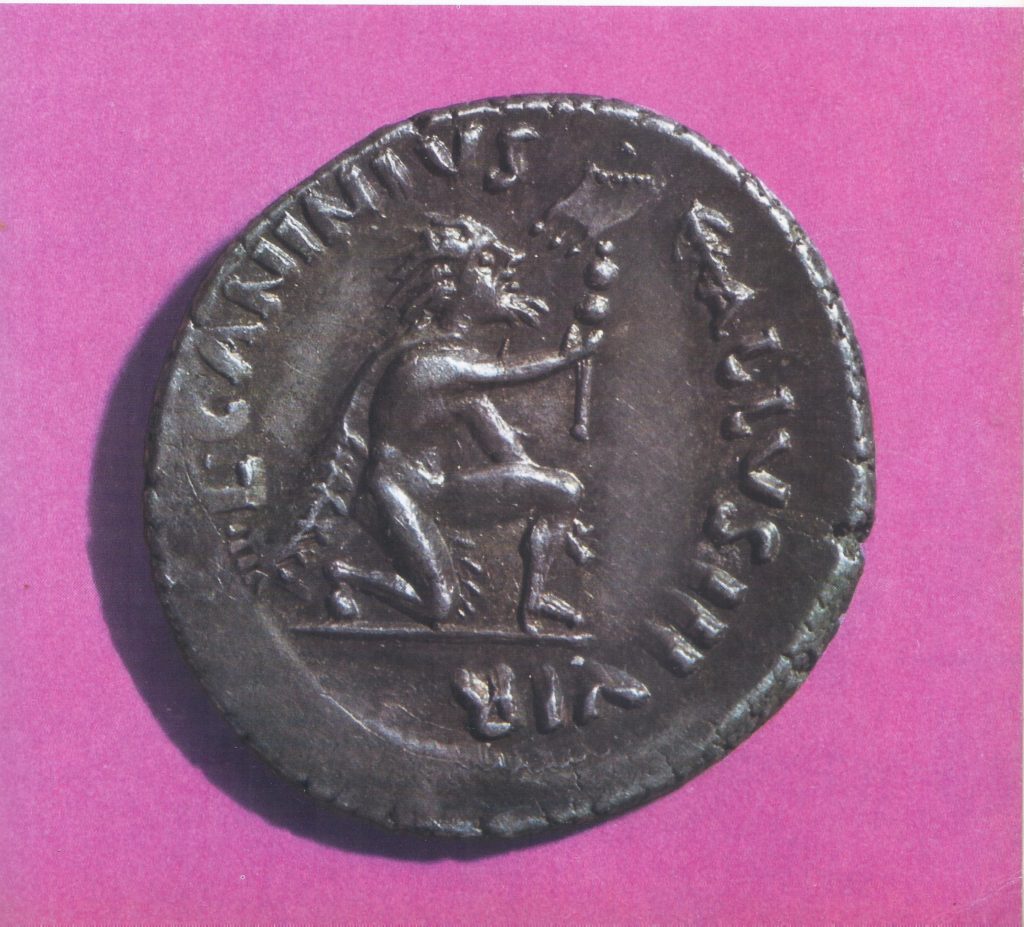
One Man Challenges Mighty Rome
In A.D. 6, therefore, twelve legions were launched in a massive three-pronged invasion under the supreme command of Augustus’ elder stepson and heir apparent, Tiberius. A huge revolt, however, broke out in northern Yugoslavia, putting an end to the campaign against Maroboduus. Nevertheless, the tribal chieftain very sensibly came to terms with Rome and was recognized as a king and friend of the Roman people. Meanwhile, the Yugoslavian revolt, described as Rome’s most grave foreign threat since Hannibal, took three years to suppress.
The new province of Germany watched these events with rising excitement. The Romans were not, after all, infallible; they had been compelled to spare Maroboduus. Prolonged resistance to their power was not beyond the bounds of possibility. These were the circumstances when a new Roman governor, Publius Quintilius Varus, reached Germany. Husband of Augustus’ grandniece, Varus was among the Emperor’s closest friends and had a hard-won reputation for firmness and order. When he arrived in Germany, however, he miscalculated the situation. He regarded the country as already subjugated and believed he could impose civilian methods of control such as were possible in the rich, well-organized provinces he had hitherto governed. The third-century Greek historian Dio Cassius describes the situation:
“The Romans held portions of the country, not entire regions but such districts as happened to have been subdued… The soldiers wintered there, and cities were being founded. Gradually the barbarians adapted themselves to Roman ways, getting accustomed to holding markets, and assembling peacefully.”
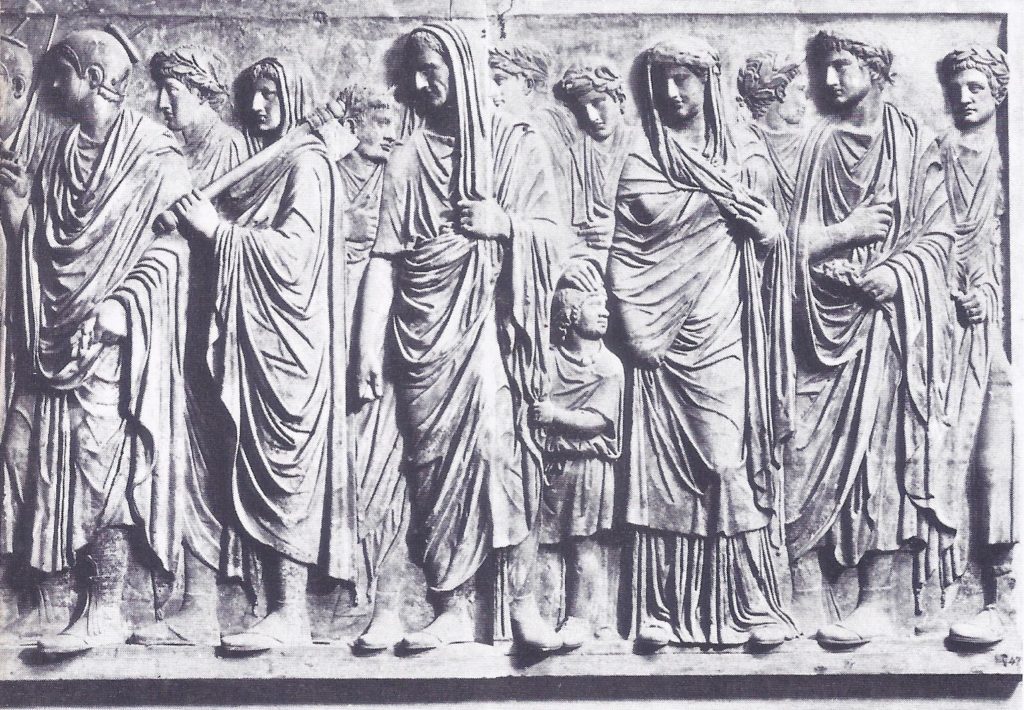
“But they had not forgotten their ancestral ways, their inborn nature, their old proud way of life, their freedom based on arms. As long as they were unlearning their ancient customs gradually and as it were by degrees, they did not protest against these changes in their mode of life, for they were growing different without being aware of it. When Quintilius Varus was appointed governor of the area and in the course of his official duties attempted to take these people in hand, striving to change them, issuing orders as though they had already been subdued and exacting money as from a subject nation, their patience was exhausted.”
Earlier, in A.D. 4, Tiberius, at that time governor of Germany, had given an important West Germanic tribe, the Cherusci, the privileged position of a federated state within the Empire. Members of their ruling class, among them the young prince Arminius, were made Roman citizens. Arminius entered the imperial service as an officer in its auxiliary military forces, gaining the status of a Roman knight.
The Cherusci, whose territory reached almost to the Elbe, played a leading part in the arrangements of Varus. Like his predecessors, Varus proposed to winter on the Rhine and spend the summer at advanced posts far inside the recently conquered province. So in A.D. 9 he established a summer camp for his three legions (6,000 men each) in Cheruscan territory. Two legions were left behind on the Rhine. His own advance headquarters were on the west bank of the Weser. Varus befriended the Cheruscan chiefs, including Arminius, little realizing that Arminius was even then plotting against him.
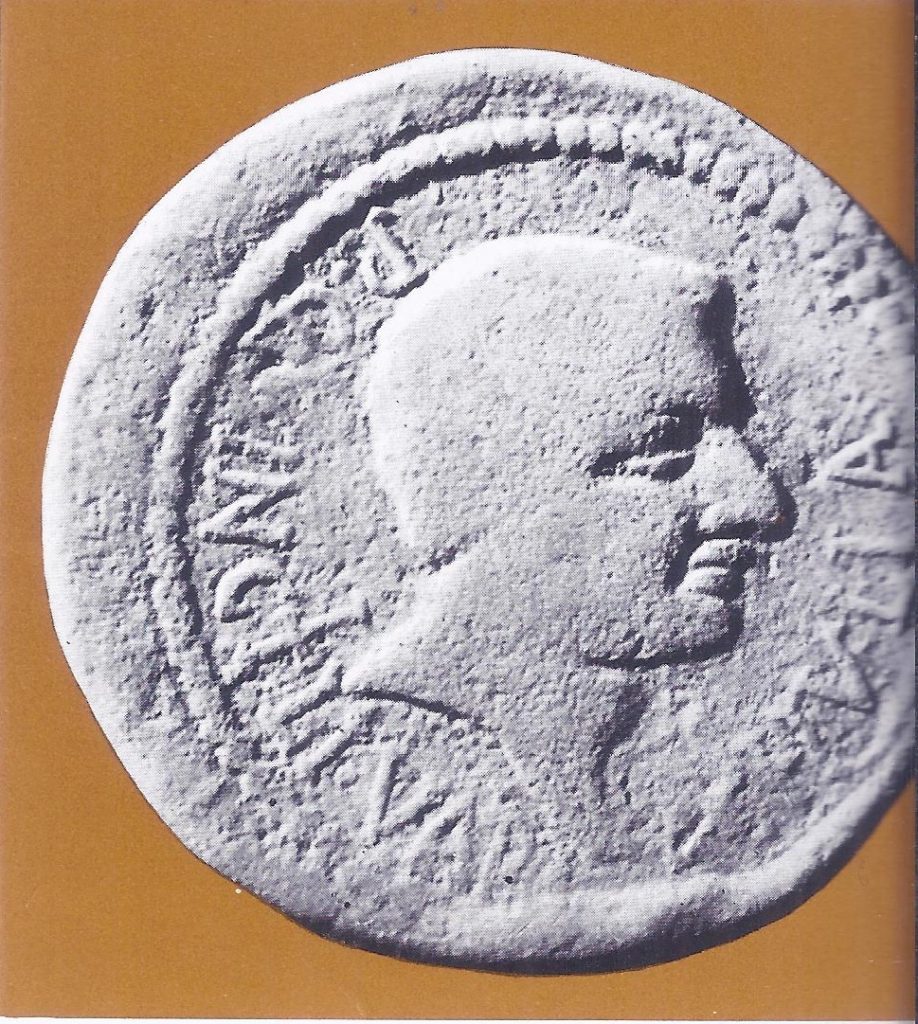
Some of the chiefs tried to warn the governor of this impending treachery, but Varus was persuaded to lend the conspirators legionary detachments, which they said they needed to guard certain posts and escort supplies for the Roman army. Moreover, when the time came for Varus to withdraw to the Rhine for the winter, the plotters persuaded him to change his route. He had intended to march back to his winter camp at Vetera by the military road, but the fictitious report of a local rising induced him to make a northwesterly detour through difficult wooded country. The conspirators saw the main army off from their summer camp on the Weser. As Varus took his leave, they asked for and received permission to rejoin their tribes — ostensibly to recruit men to help put down the revolt that they had invented.
The Roman column moved slowly. It was encumbered by a heavy baggage train and large numbers of women, children and servants. As it proceeded through the rough country, felling trees and making paths and causeways, a shower of missiles suddenly descended. There could be no doubt of what had happened. The Germans were attacking. The legionaries were hampered by the wind, rain and mud that had always made them dislike Germany. They were too short of auxiliaries — cavalry, archers and slingers — to strike back effectively. All they could do was press on and hope to reach the nearest fortress, Aliso, which lay somewhere on or near the Lippe River, perhaps two-thirds of the way from the Weser back to the Rhine.
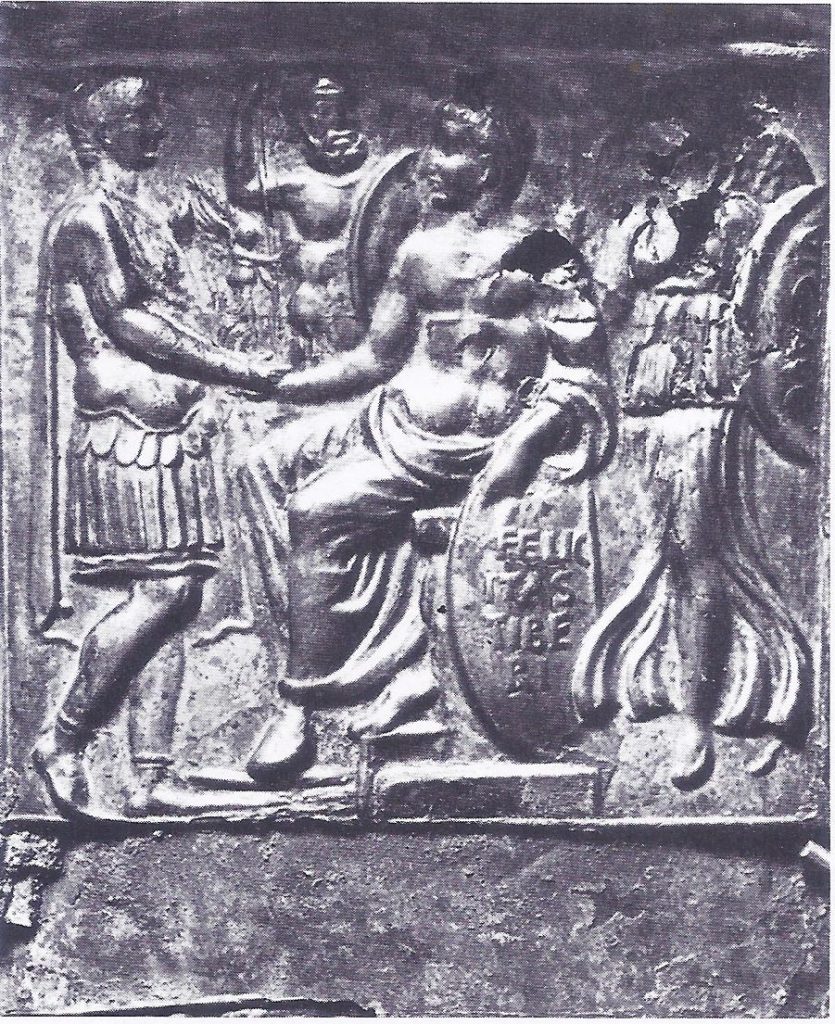
Discipline asserted itself sufficiently for a camp to be pitched for the night on high ground. Wagons and baggage were burned or jettisoned and next morning the march was resumed. The legions started off in better order over open country, but this left them vulnerable to German attacks and they were again compelled to take refuge in the woods, where they spent a most disagreeable day struggling through obstacles. They suffered heavy losses, some of them self-inflicted because of the difficulty of distinguishing enemy from friend. That night they managed to huddle together in another makeshift camp, with a totally inadequate rampart.
When morning came, it was still raining, there was a biting wind and they could see that the Germans had received reinforcements. The commander of the Roman cavalry lost his nerve and rode off with his regiment in the vain hope of reaching the Rhine. Varus was suffering from wounds and fully realized what the Germans would do to him if they caught him alive. To avoid this fate, he killed himself. Some members of his staff followed his example and the two generals who were left in charge did not long survive. One mistakenly offered capitulation, which turned into a massacre; the other fell fighting as the Germans broke into the encampment. Except for a few legionaries who escaped under cover of darkness, the entire Roman force, some 20,000 men, was either captured or slaughtered.
Six years later, another Roman commander in the area, Germanicus, formed the idea — according to his uncle Tiberius a very demoralizing one — of taking his troops to visit the site. The occasion provided Tacitus with one of his highlights:
“Now they were near the Teutoburgian Wood, in which the remains of Varus and his three legions were said to be lying unburied. Germanicus conceived a desire to pay his last respects to these men and their general. Every soldier with him was overcome with pity when he thought of his relations and friends — and reflected on the hazards of war and of human life. Caecina was sent ahead to reconnoiter the dark woods and build bridges and causeways on the treacherous surface of the sodden marshland. Then the army made its way over the tragic sites.

“The scene lived up to its horrible associations. Varus’ extensive first camp, with its broad extent and headquarters marked out, testified to the whole army’s labours. Then a half-ruined breastwork and shallow ditch showed where the last pathetic remnant had gathered. On the open ground were whitening bones, scattered where men had fled, heaped up where they had stood and fought back. Fragments of spears and of horses’ limbs lay there — also human heads, fastened to tree-trunks. In groves nearby were the outlandish altars at which the Germans had massacred the Roman colonels and senior company commanders.”
“Survivors of the catastrophe, who had escaped from the battle or from captivity, pointed out where the generals had fallen and where the Eagles were captured. They showed where Varus received his first wound and where he died by his own unhappy hand. They told of the platform from which Arminius had spoken and of his arrogant insults to the Eagles and standards — and of all the gibbets and pits for the prisoners.”
Exactly where the Roman army was annihilated is uncertain — though not for lack of attempts to locate the site. Early in the sixteenth century, when the story was becoming celebrated, the Lippischer Wald was renamed the Teutoburger Wald and a monument to Arminius now stands on the supposed site of the battle.
The Emperor’s Ambitions Thwarted
As had been feared, the triumphant Germans swept on toward the Rhine. All the advance forts to the east of the river, except Aliso, fell without resistance. Aliso’s commander and a force of archers succeeded in holding out until their stores were exhausted. Then on a dark night, the garrison slipped out — women, children and all — and managed to make its way to the winter camp at Vetera on the Rhine. There they found the province’s two remaining legions, which Varus’ nephew Lucius Asprenas had hastily brought north from Mainz.
The disaster upset Augustus more than anything in his long life and he took every counter-measure that he could think of. He dismissed all the Germans and Gauls in his personal bodyguard. Determined efforts were made to replace the lost legions, but few recruits of military age were available. Finally a force consisting mainly of retired soldiers and former slaves (who were not normally admitted to the legions) was entrusted to Tiberius, who had rushed back from Dalmatia. He led them to the Rhine to join the remaining two legions and defend the entire line of the border.
The Germans did not, however, manage to approach the Rhine. Deterred by Asprenas and delayed before the ramparts of Aliso, they lost any chance of mounting a surprise attack. Moreover, an attempt by Arminius to convert his rebellion into a national German revolt came to nothing. Such a revolt was contingent upon the support of Maroboduus, whom Arminius tried to intimidate in a gruesome manner. His men had come upon some of the Romans cremating the body of Varus in the Teutoburg Forest. They seized what was left of the corpse and mutilated it. They cut off the head and sent it to Maroboduus, appealing to him to join the insurrection, but he saw no advantage in harnessing himself to the ambition of Arminius. It seemed wiser to stand by his treaty with Rome. The head of Varus was forwarded to Augustus, who performed the funeral rites.
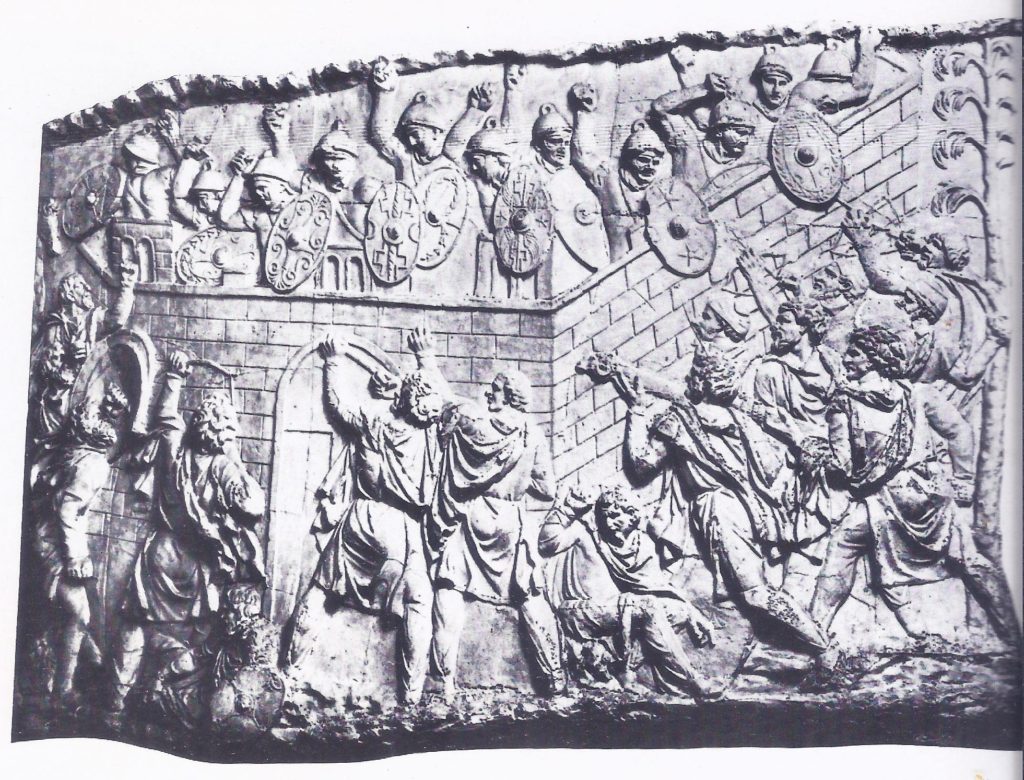
Five years later, Augustus died. Shortly before his death he sent his brilliant young grandnephew, later called Germanicus, to take command on the Rhine. When Tiberius came to the throne in A.D. 14, Germanicus fought three massive and expensive campaigns against the Cherusci. A long-standing quarrel between Arminius and his pro-Roman father-in-law Segestes flared anew, with Germanicus siding with Segestes. Arminius’ wife fell into Roman hands and although Arminius himself was urged by his brother to collaborate with Rome, he refused. So, a great battle between Arminius and the Romans was fought at Idistaviso, probably near Minden. Germanicus claimed the victory, despite the fact that his legions and auxiliaries had been forced to retreat, but the Germans were far from subjugated.
In A. D. 19 Arminius picked a quarrel with Maroboduus, the German who had snubbed him and a battle ensued. Although the outcome was indecisive, Maroboduus lost much of his power and soon afterward his Bohemian kingdom lost its independence. Arminius’ end was also at hand, as Tacitus describes:
“I find from the writings of contemporary senators, that a letter was read in the Roman senate from a chieftain of the Chatti, Adgandestrius by name, offering to kill Arminius if poison were sent him for the job. The reported answer was that Romans take vengeance on their enemies, not by underhand tricks, but by open force of arms.”
However, the Roman evacuation of Germany and the fall of Maroboduus had induced Arminius to aim at kingship, but his freedom-loving compatriots forcibly resisted. The fortunes of the fight fluctuated, but finally Arminius succumbed to treachery from his relations.
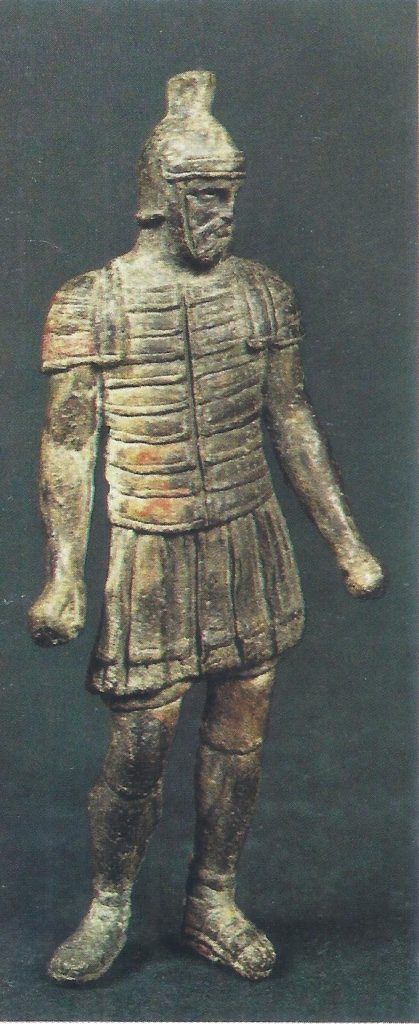
“He was unmistakably the liberator of Germany. Challenger of Rome — not in its infancy, like kings and commanders before him, but at the height of its power — he had fought undecided battles and never lost a war. He had ruled for twelve of his thirty-seven years. To this day the tribes sing of him. Yet Greek historians ignore him, reserving their admiration for Greece. We Romans, too, underestimate him, since in our devotion to antiquity we neglect modern history.”
Tacitus was justified in calling Arminius the man who had freed Germany. He was not, however, a national chief. “He was only,” wrote one historian, “the leader of a faction even among his tribesmen, not a champion of the German nation, for no such thing existed. The very name was of recent date, an alien appellation; there was among the Germans little consciousness of a common origin, of a common interest none at all.”
Still, it was thanks to his extraordinary skill and courage that the Romans were excluded, from then on, from Germany across the Rhine. With the exception of a coastal strip and a tract on the upper Rhine and Danube, the province was abandoned. Rome was forced to recognize that annexation was impossible or inadvisable and to treat trans-Rhenane Germany as a client-state, dependent economically, but nothing more.
Had Arminius not frustrated Augustus in his aim to establish an Elbe-Bohemia-Danube frontier, almost the whole of the present Federal Republic of Germany and the Czech area of Czechoslovakia would have been parts of the Roman Empire. Might-have-beens are notoriously unprofitable, but it is likely that in the end these territories, under Roman rule, would have become as docile and Latinized as Gaul. Any idea of the Rhine as a frontier would have been irrelevant and forgotten. The whole concept of Germany would have been unimaginably different, and so, therefore, would every subsequent century of European history.
